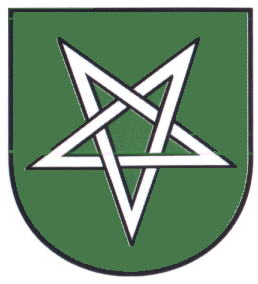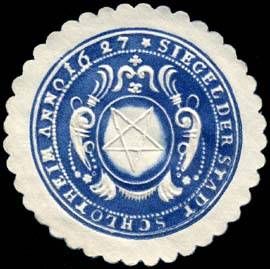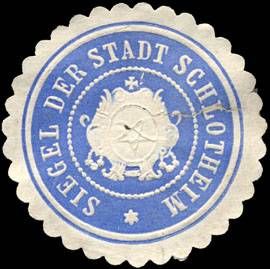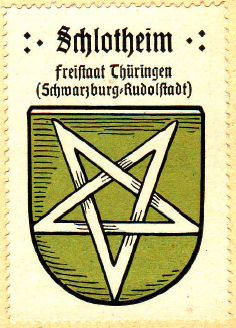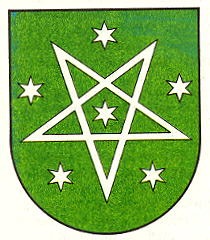Schlotheim: Difference between revisions
Knorrepoes (talk | contribs) m (Text replacement - "50 px|link=Germany" to "") |
Knorrepoes (talk | contribs) No edit summary |
||
| Line 1: | Line 1: | ||
{{de}} | {{de}} | ||
'''SCHLOTHEIM''' | '''SCHLOTHEIM''' | ||
State : [[Thüringen]]<br/> | State : [[Thüringen]]<br/> | ||
District (Kreis) : [[Unstrut-Hainich Kreis]]<br/> | District (Kreis) : [[Unstrut-Hainich Kreis]]<br/> | ||
Additions : 1994 [[Mehrstedt]] | |||
[[File:schlothe.jpg|center|Wappen von {{PAGENAME}}]] | [[File:schlothe.jpg|center|Wappen von {{PAGENAME}}]] | ||
Revision as of 12:33, 19 December 2018
This page is part of the German heraldry portal Deutsche Wappensammlung |
Heraldry of the World |
|
German heraldry:
|
Selected collector's items from Germany:
|
SCHLOTHEIM
State : Thüringen
District (Kreis) : Unstrut-Hainich Kreis
Additions : 1994 Mehrstedt
Official blazon
(de) In Grün ein silberner Drudenfuß.
Origin/meaning
The arms are known since 1627. The arms show a magical pentagramme. The pentagramme is a symbol to bind or expel certain powers. It should for example expel war and fire. The symbol probably was chosen as a symbol to avoid the 30-years war that raged in Germany at the time, and which reached Schlotheim in 1626.
The arms have been often shown as personal arms, with a helmet and mantling of green and silver. As a crest a castle was used. In 1984 the arms were shown with 6 stars in and around the star, which, according to the source was identical to the 17th century seals of the city (see below). Hupp showed in the 1920s the arms identical to the present arms, without stars.
| Seal from around 1900 |
Seal from around 1900 |
| The arms by Hupp in the Kaffee Hag albums +/- 1925 |
The arms during DDR times |
Contact and Support
Partners:
Your logo here ?
Contact us
© since 1995, Heraldry of the World, Ralf Hartemink 
Index of the site
Literature : Ulle, 1998; Benzing et al. 1984



